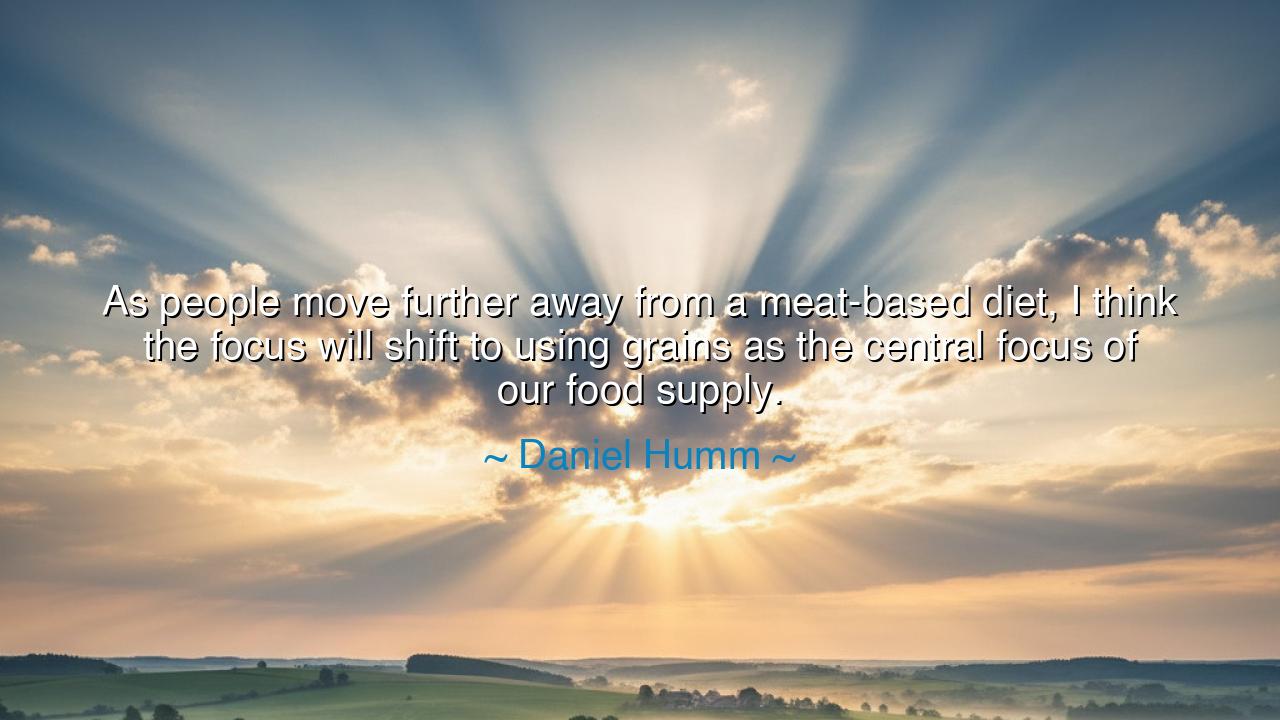
As people move further away from a meat-based diet, I think the
As people move further away from a meat-based diet, I think the focus will shift to using grains as the central focus of our food supply.






The words of Daniel Humm, “As people move further away from a meat-based diet, I think the focus will shift to using grains as the central focus of our food supply,” speak not only of culinary change, but of a deeper evolution — the quiet turning of the human spirit back toward harmony with the earth. In his vision, there is not merely a change of diet, but a transformation of consciousness: a movement from dominance to balance, from indulgence to sustainability, from fleeting pleasure to nourishment that endures. What Humm describes is not just a trend in cuisine; it is the rekindling of an ancient wisdom that humanity once lived by and has long forgotten.
In ages past, before the fires of industry and the hunger of empires, grains were revered as sacred gifts. The Egyptians worshiped them in the form of Osiris, the god of life and rebirth. The Greeks honored Demeter, goddess of the harvest, whose tears became the rain that fed the fields. Even in the East, the humble grain of rice was called “the staff of life.” In these civilizations, the grain was not simply food — it was the bridge between the human and the divine, the cycle of death and renewal made visible. Through the sowing and reaping of grain, ancient peoples saw reflected the rhythm of their own lives: patience, toil, gratitude, and return.
But as humanity grew wealthier, it also grew restless. The table of the world became a feast of flesh — meat, once rare and sacred, became common and constant. The balance shifted from reverence to appetite. With the rise of this meat-based diet, entire landscapes were transformed: forests cleared for pasture, rivers polluted by waste, air thickened with the smoke of excess. The earth groaned under the weight of human desire. And yet, as Humm foresees, a return is coming — a return not backward, but inward, toward simplicity, consciousness, and respect for the abundance that sustains us.
In the story of every civilization lies a moment of reckoning — a time when the people must choose between continuing the path of consumption or rediscovering the art of balance. Consider India, where for centuries vast communities have thrived on diets rooted in grains, legumes, and vegetables. Their traditions were not born of scarcity, but of understanding: that food is medicine, and that to harm less is to live more harmoniously. Such cultures reveal what Humm suggests — that grains, in their quiet strength, can feed not only the body, but the soul of a civilization. They do not demand destruction to yield abundance; they ask only for care, for rhythm, for gratitude.
When Humm envisions grains as the “central focus of our food supply,” he is speaking also of a moral realignment — a recognition that progress does not lie in consuming more, but in creating wisely. To center our diet around grains is to center our lives around sustainability and compassion. It is to remember that true luxury is not excess, but harmony — not extravagance, but wholeness. The future, if guided by such principles, will not hunger for what it cannot sustain. It will grow what nourishes all.
This vision is not new; it is a return to ancient truth wrapped in modern understanding. The old farmers knew that a single grain could yield a thousand seeds, and that one season’s patience could feed a village. So too must modern humanity learn patience again — to replace the instant indulgence of the flesh with the steady nourishment of the field. For the grain teaches endurance: it grows silently, humbly, in rows of gold beneath the sun, asking nothing but care, and giving life to all who partake.
Let this then be the teaching: honor the grain. See in it the symbol of balance, of continuity, of compassion. Let your plate become a reflection of the earth’s wisdom — simple, abundant, and kind. Choose foods that restore rather than deplete, that give life not only to you but to the world that feeds you. In doing so, you do not merely follow a diet; you participate in the healing of creation itself.
And as Daniel Humm foretells, the day will come when our meals are once again an offering — not to appetite, but to life. When we return to the grains, we will find not poverty, but plenty; not sacrifice, but peace. For those who walk the path of balance will discover that the simplest foods hold the greatest truth — that in every grain of wheat, every kernel of rice, lies the promise of renewal, the whisper of the earth saying: You are sustained, if only you remember how to live in harmony with me.






AAdministratorAdministrator
Welcome, honored guests. Please leave a comment, we will respond soon